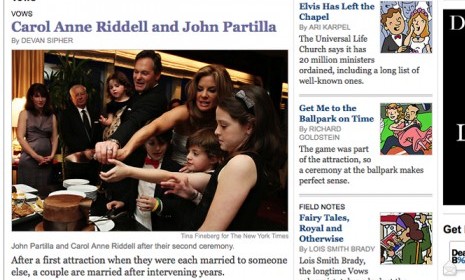Is 'The New York Times' celebrating 'homewrecking'?
The newspaper's "Vows" section tells the story — too glowingly, some say — of a couple who dumped their existing spouses to wed

A free daily email with the biggest news stories of the day – and the best features from TheWeek.com
You are now subscribed
Your newsletter sign-up was successful
Although New York Times' wedding announcements don't usually generate heated debate, a couple featured in Sunday's "Vows" section have quickly become controversial. Carol Anne Riddell and John Partilla first crossed paths four years ago in their children's pre-kindergarten classroom. Only catch: Each was already married. "The connection was immediate, but platonic," notes the Times. Eventually, though, the pair decided to leave their spouses and the Times' decision to publicize their union, in a forum typically dedicated to snootily inspiring tales of love, is generating outrage. ("Staggeringly monstrous," cried one critic.) Is the Gray Lady condoning "homewrecking"?
The Times has been heading in this direction: What's so shocking, asks Adrian Chin at Gawker. "The Times has been probing the darker side of the 'how did you meet' story for a while." Besides, a "traditional" wedding announcement "mercilessly" flaunts a couple's perfection; this one juicily highlights flaws. "Which one would you rather read?"
"Homewrecking couple's scandalous New York Times wedding announcement"
The Week
Escape your echo chamber. Get the facts behind the news, plus analysis from multiple perspectives.

Sign up for The Week's Free Newsletters
From our morning news briefing to a weekly Good News Newsletter, get the best of The Week delivered directly to your inbox.
From our morning news briefing to a weekly Good News Newsletter, get the best of The Week delivered directly to your inbox.
This is the state of journalism: The Times once used euphemisms when the couple was a product of an affair or a "spouse-dumping," says Mike Vilensky in New York. "But now, with print media... competing with saucier online writing, the spouse-dumping goes right in the lede," and the dumpers speak with "unmitigated pride." Still, despite the Times' romanticizing efforts, the story comes across as "awkward and sort of sad."
"Times no longer even euphemizing spouse-dumping"
But it's bad journalism: The story doesn't follow "basic journalistic practice," says Jeff Bercovici in Forbes. The ex-spouses aren't mentioned by name, and it doesn't seem the reporter called them for comment, which I find problematic. While "undoubtedly" an interesting story, it would be even more interesting had the ex-spouses been interviewed.
"The story behind that controversial NYT 'Vows' column"
A free daily email with the biggest news stories of the day – and the best features from TheWeek.com
The "Vows" section should change its name: This isn't a celebratory story of people taking marriage vows seriously, says Kathryn Jean Lopez in the National Review. It's a "heartbreaking" tale of a couple who abandoned their previous commitments. The real message is: "Make sure you have the kind of lovingly rigorous support system — faith, friends, family" to help you stick to the smart path.
"The beyond-'Vows' section of the New York Times"
We shouldn't be so quick to judge: Who's to say that sticking with an unhappy, unfulfilling, or even unhealthy marriage "is for the ultimate best?" asks Mary Elizabeth Williams in Salon. While it's a bit mind boggling that this couple would want to share their story publicly, and that the Times would want to report on it, maybe in our media-savvy age of over-sharing, it was "easier to give a public version of events than to repeat it forever to every curious friend."
-
 Political cartoons for February 16
Political cartoons for February 16Cartoons Monday’s political cartoons include President's Day, a valentine from the Epstein files, and more
-
 Regent Hong Kong: a tranquil haven with a prime waterfront spot
Regent Hong Kong: a tranquil haven with a prime waterfront spotThe Week Recommends The trendy hotel recently underwent an extensive two-year revamp
-
 The problem with diagnosing profound autism
The problem with diagnosing profound autismThe Explainer Experts are reconsidering the idea of autism as a spectrum, which could impact diagnoses and policy making for the condition